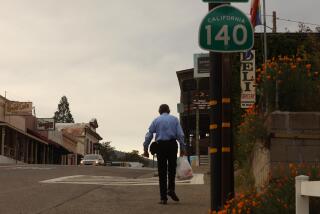Up ‘For Sale’ Brings Tears for Lost Roots
- Share via
“He’ll be 98 this July,” I proudly told a neighbor recently. “Still lives in the same house in Pennsylvania that he built 72 years ago for Nana! Sure he’s fine! Just a little trouble with his eyes.”
I guess there was more difficulty than I knew: unremitting loneliness since Nana’s death more than 10 years ago, double vision and a general disinterest in life.
Still, it came as a shock when my mother announced that Pappaw had decided to sell the house on Duke Street and move into a retirement community. The word “sell” rang like the dull thud of a prison door, and I couldn’t explain the stream of tears that came without warning.
After all, my grandfather had courageously chosen to begin a new life after nearly a century of living. So why the undeniable pang of loss and deep sadness? And then I realized--along with my brother and sister--that our childhood had been put on the auction block, and whatever roots we tangibly claimed to innocence would vanish with the “For Sale” sign.
Somehow, amid all the many moves my family made when I was a child--I finally ended up in Orange County-- and the uneasiness of watching my parents’ marriage slowly fall apart, Pappaw and Nana’s house emerged as the sanctuary. Each room--breathing the essence of family history, tradition and love--continued to offer both delight and peace.
From basement to attic, this skinny, red brick house with its long, narrow lawn and garden opened its doors to a treasure trove of sights and smells. On each visit, once we had assured ourselves that everything was in its proper place, my sister and brother and I would race to our favorite site--the attic.
We entered the attic through Nana’s little curtained sewing room, pausing often to pump the treadle of the black Singer or paw through her button bag. Ah, but the musty room above, filled with such treasures as Shirley Temple paper dolls, tin Mickey Mouse tea sets, a child-size roll-top desk, flannel art boards and marvelous old clothes. Here we would play for hours until hunger or heat drove us into the kitchen for Nana’s crab cakes, cherry pie or pretzels with mustard.
The bedrooms were strung like pearls and you skipped through a number of them to enter the one-and-only bathroom with its claw-foot tub and leaded glass window. At the end of the row of bedrooms was a screened sun porch with a brass bed--the bed where my mother was born. From the porch, we would watch the sky darken and the church steeple become illuminated above the trees while Pappaw rocked in his cane chair and told us our favorite bedtime stories of the “good old days.” On my last visit, just this past summer, Pappaw still spun tales as I struggled to stay on the one good spot of the bed’s aging mattress.
Oh, there is--soon to be “was”--so much more: the cool cellar with Nana’s market baskets hung like ornaments on the crossbeams, the formal sitting room with crocheted head rests, family pictures (and even a portrait of Pope Pius XII), Pappaw’s antique reclining chair in the dining room, backyard garages with wooden sliding doors and an assortment of garden tools. Memories seem elastic when stretched for so many years.
The point, I suspect, is this: Are there many more like us who can claim images so rich and and whole and encompassing such generous spans of time? Or has the spirit of place become a distant idea, lost in the move toward tract homes, condominiums and other housing ventures? I don’t have an answer, though I grieve that my children, growing up in Laguna Niguel, will never be able to recapture such roots.
And so, Pappaw, as you strongly demonstrate, life goes on. I think I’m beginning to understand that it will have to be enough to make each day into a place of peace, joy and laughter. No “For Sale” sign can touch that.






